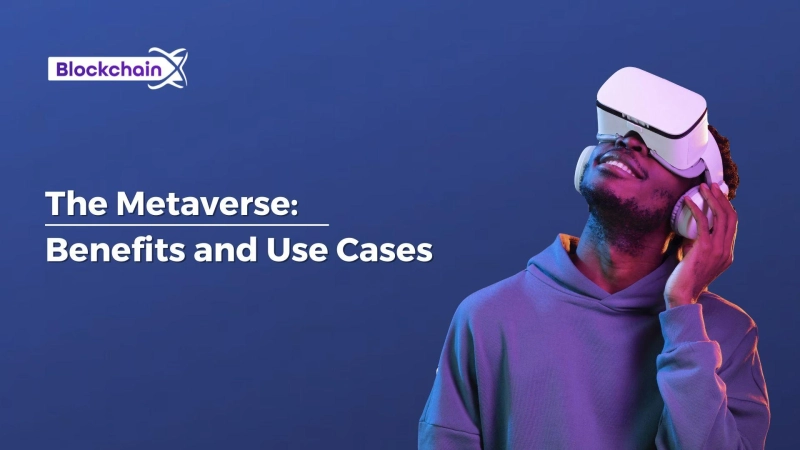Introduction:
The concept of the metaverse has gained significant attention in recent years, capturing the imagination of both tech enthusiasts and mainstream audiences. Coined by Neal Stephenson in his 1992 science fiction novel “Snow Crash,” the metaverse refers to a virtual reality space that encompasses the sum of all virtual worlds, augmented reality, and the internet. This article delves into the benefits and potential use cases of the metaverse, showcasing the transformative possibilities it presents across various industries and aspects of life.
Enhanced Social Interaction:
One of the primary benefits of the metaverse lies in its potential to revolutionize social interaction. By offering immersive and realistic virtual environments, individuals can connect with friends, family, and even strangers from anywhere in the world. It transcends geographical boundaries, allowing people to engage in shared experiences, attend virtual events, and collaborate on projects, fostering a sense of belonging and community. The metaverse opens up endless possibilities for communication and collaboration, enhancing interpersonal relationships in ways previously unimaginable.
Experiential Learning and Education:
The metaverse has the power to transform education by providing immersive and interactive learning experiences. Students can step into virtual classrooms, explore historical sites, or conduct experiments in a safe and controlled environment. This technology enables educators to create dynamic and engaging lessons, catering to various learning styles and preferences. Moreover, the metaverse allows for global collaboration among students and teachers, breaking down traditional barriers and facilitating knowledge exchange on a global scale.
Augmented Workplaces:
With the metaverse, the concept of remote work takes on a new dimension. Virtual offices and workspaces can provide employees with a seamless and immersive work environment, complete with virtual colleagues, interactive dashboards, and real-time collaboration tools. This integration of virtual reality and augmented reality technologies enhances productivity, creativity, and communication among teams. Furthermore, the metaverse allows for businesses to host virtual conferences, seminars, and trade shows, expanding networking opportunities and reducing logistical constraints.
Entertainment and Gaming:
The entertainment industry stands to benefit immensely from the metaverse. Virtual reality gaming experiences can reach new heights, enabling players to immerse themselves in lifelike environments and interact with virtual characters in unprecedented ways. Moreover, the metaverse blurs the lines between different forms of entertainment, merging gaming, movies, music, and more into a single cohesive experience. This convergence opens up avenues for interactive storytelling, personalized narratives, and user-generated content, offering users limitless possibilities for entertainment and self-expression.
E-commerce and Retail:
The metaverse holds immense potential for e-commerce and retail businesses. Virtual stores can provide a unique and personalized shopping experience, allowing customers to browse and purchase products in a virtual environment. With augmented reality, shoppers can try on virtual clothes or test virtual furniture in their own homes, providing a more informed purchasing decision. The metaverse also offers opportunities for brands to create immersive marketing campaigns, enabling customers to engage with products and experiences in a highly interactive and memorable way.
Healthcare and Wellness:
In the field of healthcare, the metaverse can enhance patient care and well-being. Virtual reality therapies can be utilized for pain management, rehabilitation, and mental health treatments, offering patients an immersive and controlled environment for healing and recovery. Additionally, healthcare professionals can collaborate in virtual spaces, discussing complex cases, conducting simulations, and sharing knowledge. The metaverse also facilitates telemedicine, enabling remote consultations and medical assistance, particularly in underserved areas.
Urban Planning and Architecture:
The metaverse use case has the potential to revolutionize urban planning and architecture. Architects and urban planners can create virtual models of cities and environments, allowing stakeholders to visualize and experience proposed designs. This immersive approach can help identify potential issues, optimize resource allocation, and gather feedback from the community before implementing physical changes. The metaverse serves as a testing ground for innovative urban development, fostering sustainable and inclusive cities.
Conclusion:
The metaverse represents a paradigm shift in the way we interact, learn, work, and entertain ourselves. Its benefits extend to various sectors, offering new avenues for socialization, education, business, and creativity. While the metaverse is still in its early stages, its potential for transforming industries and shaping the future is undeniable. As this technology continues to evolve, it is essential to navigate ethical and privacy considerations to ensure a responsible and inclusive metaverse that benefits individuals and society as a whole.


